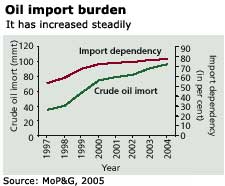Oil import burden
 The opportunities in biodiesel are manifold. A renewable, environment-friendly source of energy is something India desperately needs. There is no question about that. But that doesn't mean the questions aren't there. There is already a strong realisation that the economic reforms of the 1990s haven't helped improve the rural economy. The biodiesel programme is one tool with governments to make up for that.
The opportunities in biodiesel are manifold. A renewable, environment-friendly source of energy is something India desperately needs. There is no question about that. But that doesn't mean the questions aren't there. There is already a strong realisation that the economic reforms of the 1990s haven't helped improve the rural economy. The biodiesel programme is one tool with governments to make up for that.
Which way will this programme go? Who will own the business of growing the oil of the future? Will we see concentration of wealth in the hands of a few or greater distribution of wealth? A lot will depend on who owns the land on which the biodiesel plants are grown and the arrangements made to buy the raw material. The primary producer has a disadvantage if the market is allowed to have a free reign. At the same time, the government can't stifle the private enterprise and all the attendant efficiencies it brings. Handling this will test the resolve of any government.
The impetus for the programme is coming from the escalating oil prices and the great burden it puts on a developing country like India (see graph: Oil import burden). What's also driving the sector is the eu mandating compulsory blending of biofuels. It is far cheaper for companies to grow the trees in developing countries. For India, this advantage is a result of the same rural population its policy-makers so love to ignore and its so-called marginal lands. To harness this sector and make the best use of it
Related Content
- Navigating the Indian energy trilemma: the role of liquefied petroleum gas
- Regional economic outlook for Asia and Pacific: steady growth amid diverging prospects
- Africa agriculture status report 2023:empowering Africa’s food systems for the future
- Charting an electricity sector transition pathway for Bangladesh
- Financing climate-friendly cooling at city scale
- Electric vehicle lithium-ion batteries in lower- and middle-income countries
